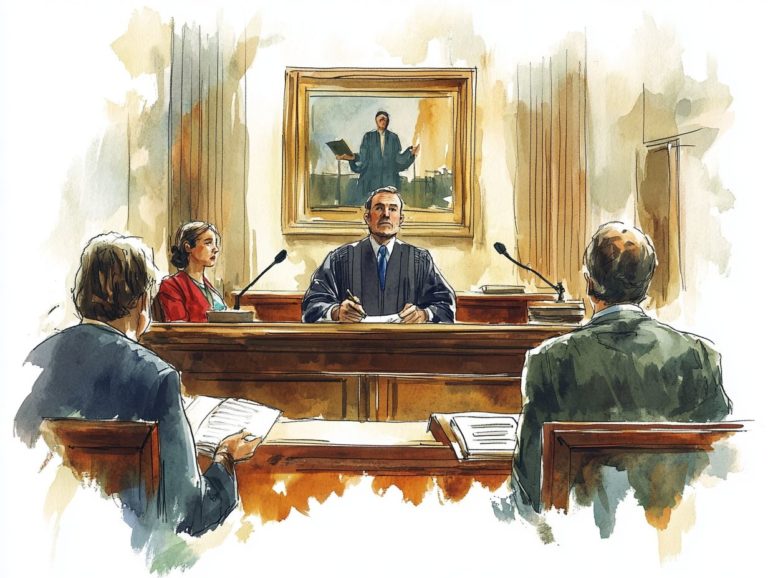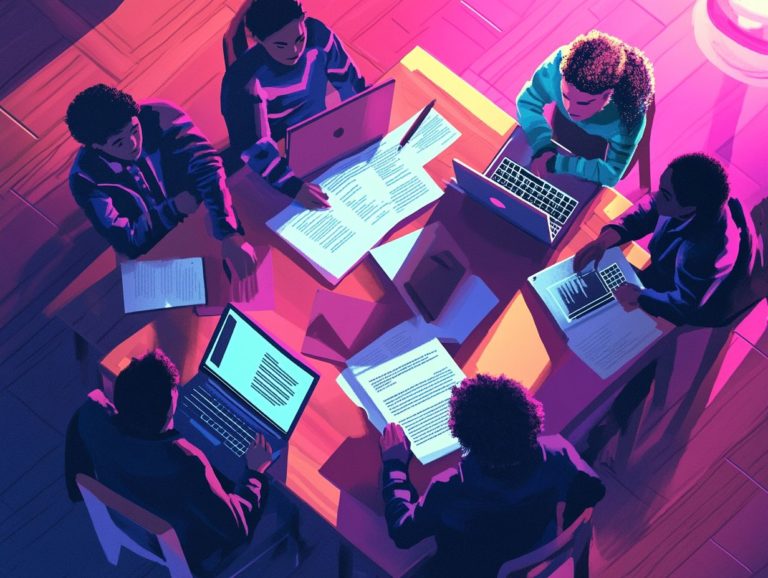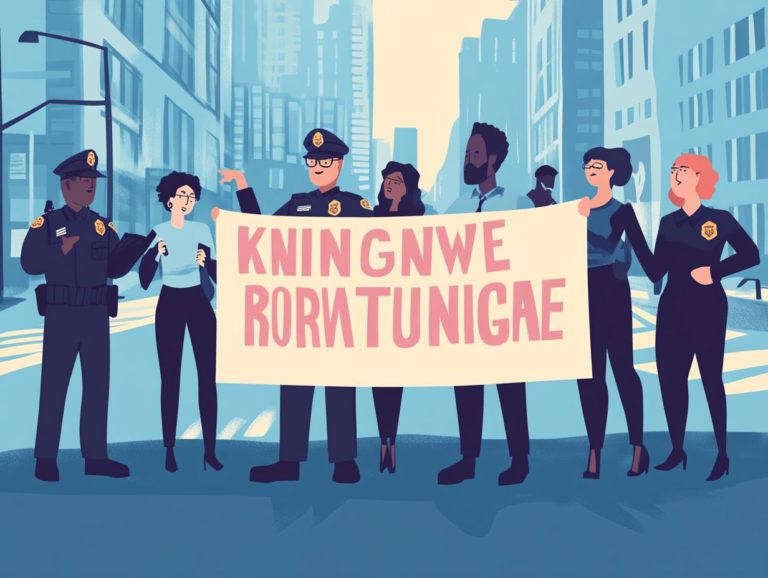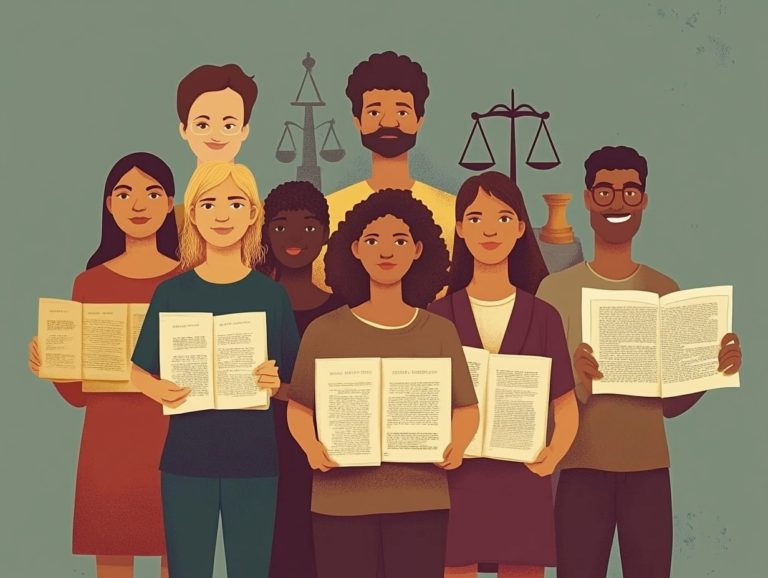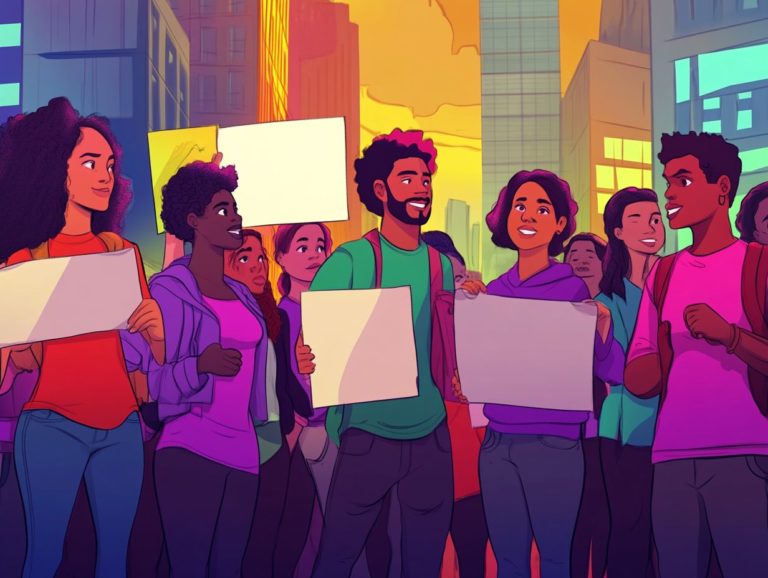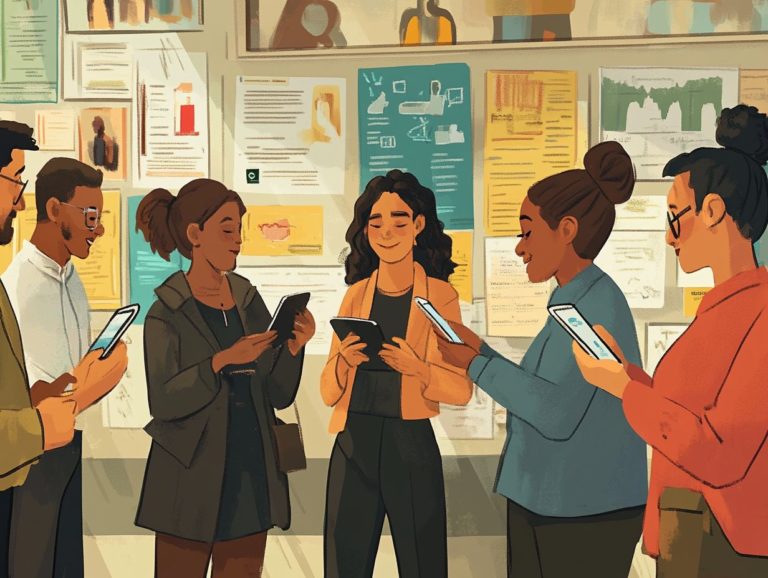Top 5 Rights of the Accused Explained
In the American justice system, your rights as the accused are fundamental to ensuring fairness and integrity in legal proceedings.
From the right to remain silent to the presumption of innocence, these protections are designed to uphold justice and shield individuals from wrongful convictions.
This piece delves into the crucial rights afforded to you as the accused, tracing their evolution over time and emphasizing the vital role defense attorneys play in safeguarding those rights.
Understanding these principles clarifies the legal landscape and underscores the importance of protecting the innocent.
Join us now to uncover these vital rights that protect you today!
Contents
- Key Takeaways:
- 1. The Right to Remain Silent
- 2. The Right to an Attorney
- 3. The Right to a Fair and Speedy Trial
- 4. The Right to Confront Witnesses
- 5. The Right to Present Evidence and Call Witnesses
- 6. The Right to Be Presumed Innocent
- 7. The Right to a Public Trial
- 8. The Right to a Jury Trial
- 9. The Right to Be Informed of Charges
- 10. The Right to Be Protected from Double Jeopardy
- 11. The Right to Be Informed of Rights
- 12. The Right to an Impartial Judge
- 13. The Right to Challenge Evidence
- 14. The Right to Appeal
- 15. The Right to Due Process of Law
- What Are the Rights of the Accused in the United States?
- Frequently Asked Questions
Key Takeaways:
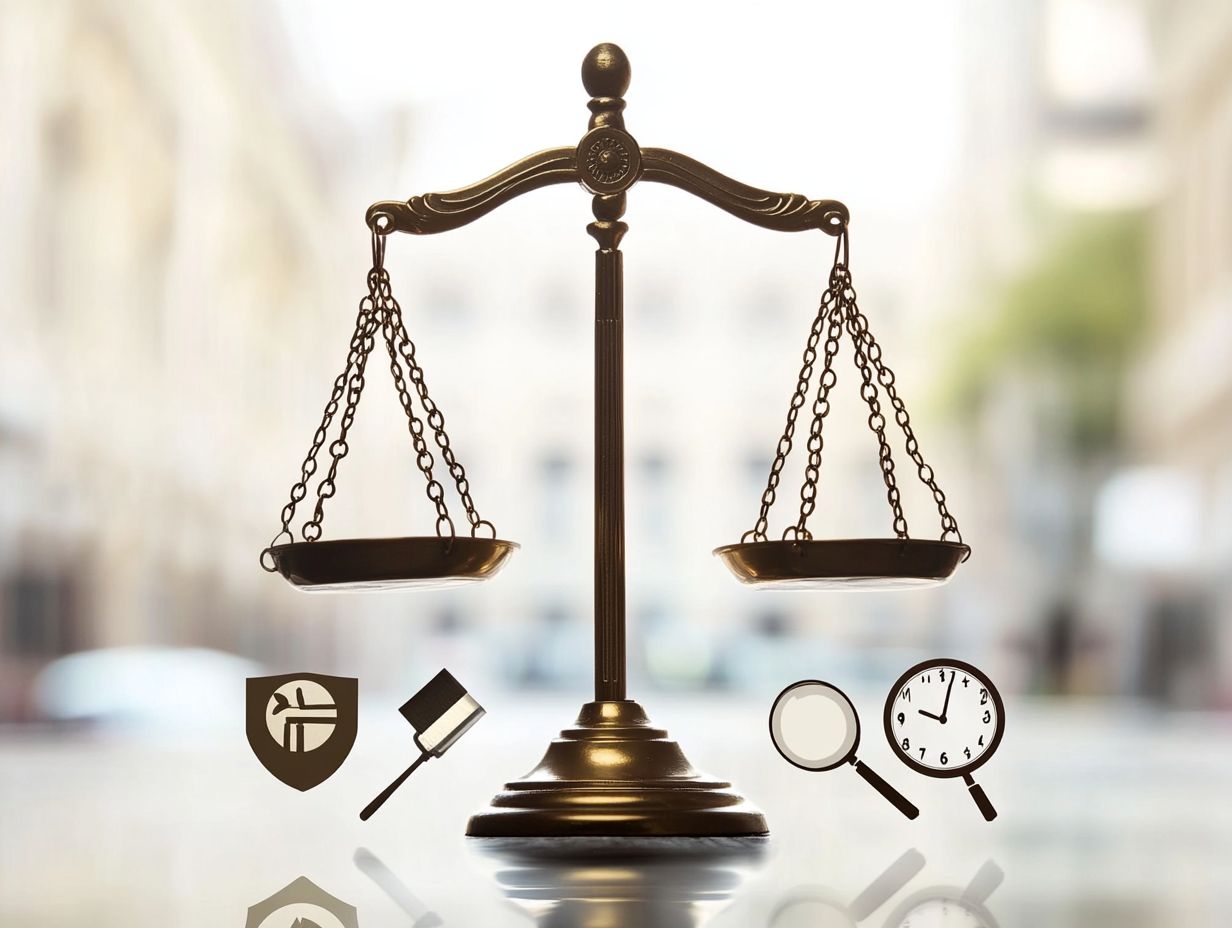
The right to remain silent is a fundamental protection for the accused.
An attorney is crucial in upholding the rights of the accused and ensuring a fair trial.
A fair and speedy trial, the right to confront witnesses, and the right to present evidence are all essential rights for the accused.
1. The Right to Remain Silent
The Right to Remain Silent is a cornerstone of the U.S. legal system that enables you to refrain from self-incrimination. This ensures that when you face criminal charges, you can exercise your constitutional rights without the anxiety of revealing damaging information during legal proceedings.
This principle is famously encapsulated in the Miranda rights, which protect your ability to stay silent when approached by law enforcement.
This right is crucial to safeguard against unfair interrogation tactics that can lead to false confessions. Waiving this right can jeopardize your defense.
Miranda warnings not only inform you of your rights but also emphasize the importance of shielding you from self-incrimination. Case law, such as Miranda v. Arizona, highlights the essential role this right plays in maintaining the integrity of the legal process, ensuring that justice remains fair and just for everyone involved.
2. The Right to an Attorney
The Right to an Attorney is a cornerstone of the American judicial system, rooted in the important court case Gideon v. Wainwright. This ruling established that defendants are entitled to legal representation, regardless of their financial means, ensuring that your rights are safeguarded throughout the criminal justice process.
This decision shows that justice is for everyone, not just the wealthy. The role of effective counsel is paramount; attorneys are your advocates, guiding you through the intricate legal landscape and crafting defense strategies crucial for securing a fair trial.
With the right to counsel enshrined in the Sixth Amendment of the U.S. Constitution, the judiciary seeks to promote equity, underscoring the importance of fair representation in preserving the integrity of the legal system.
3. The Right to a Fair and Speedy Trial
The Right to a Fair and Speedy Trial is a fundamental guarantee in the Sixth Amendment of the U.S. Constitution. This provision protects you from prolonged detention without trial and ensures that justice is served without unnecessary delays, maintaining respect for your individual liberty.
This constitutional provision has evolved to reflect changing societal values. The emphasis on fair treatment through the normal judicial system highlights its crucial role in safeguarding your rights, ensuring you have a fair opportunity to contest charges against you.
By prioritizing speedy trials, the legal framework minimizes the risk of wrongful convictions an issue that affects not just the accused, but also public trust in law enforcement.
Striking a balance between accountability and your rights as a defendant shapes how justice is administered, ensuring that the scales of justice weigh equally for everyone involved in the judicial system.
In conclusion, understanding your rights as the accused is vital for navigating the complexities of the legal system. These rights not only protect individuals but uphold the integrity of justice itself.
4. The Right to Confront Witnesses
The Right to Confront Witnesses is a crucial aspect of the Sixth Amendment, granting you the ability to challenge the testimony of witnesses in court. This right helps protect you from wrong practices in the legal system and ensures transparency and fairness in legal proceedings.
By enabling you to defend yourself, this right acts as a vital safeguard against potential abuses within the judicial system. The opportunity to confront witnesses directly cultivates an atmosphere of accountability, compelling the prosecution to present credible and reliable evidence.
Landmark cases like Crawford v. Washington and Ohio v. Roberts have reinforced this right, shaping its interpretation and underscoring its significance in maintaining procedural fairness. These rulings highlight the necessity of cross-examination, which is the opportunity to question witnesses, as a cornerstone in defending the accused and bolstering the integrity of the legal process.
5. The Right to Present Evidence and Call Witnesses
The Right to Present Evidence and Call Witnesses is a fundamental aspect of your defense in court. It enables you to advocate for yourself, ensuring that the legal system adheres to principles of fairness and justice. This right allows you to construct your defense by presenting relevant evidence and witness testimonies.
This right is essential for a fair trial because it enables you to challenge the prosecution’s case and assert your innocence. Legal advocacy becomes crucial in this process, guiding you in selecting credible evidence and relevant witnesses who can support your claims.
You can present various types of evidence, including:
- Physical artifacts.
- Documents.
- Expert analyses.
Witness testimonies hold immense value as well; these firsthand accounts can provide critical insights and context to bolster your defense.
Ultimately, this right also works alongside the prosecution’s rights, ensuring a balanced confrontation where both parties can thoroughly and justly present their cases.
6. The Right to Be Presumed Innocent
The Right to Be Presumed Innocent is a cornerstone of the U.S. legal system, essential for protecting individual liberty and upholding the rights of defendants. This principle puts the pressure on the prosecution to prove their case, affirming that no one is considered guilty until proven otherwise beyond a reasonable doubt.
With roots tracing back centuries, this principle reflects a deep societal commitment to fairness and justice. By insisting that the accused are innocent until proven guilty, it serves as a crucial safeguard against wrongful convictions and acts as a barrier against potential abuses within the judicial process.
The ramifications for the criminal justice system are far-reaching; this presumption shapes law enforcement s approach, compelling them to gather adequate evidence before making an arrest, while also urging prosecutors and juries to meticulously scrutinize the evidence presented.
Sadly, there have been shocking cases, like the wrongful conviction of Anthony Ray Hinton, that highlight the devastating consequences when this right is not upheld. Such cases underscore the pressing need for robust legal protections to prevent future injustices and ensure a fairer system for all.
7. The Right to a Public Trial
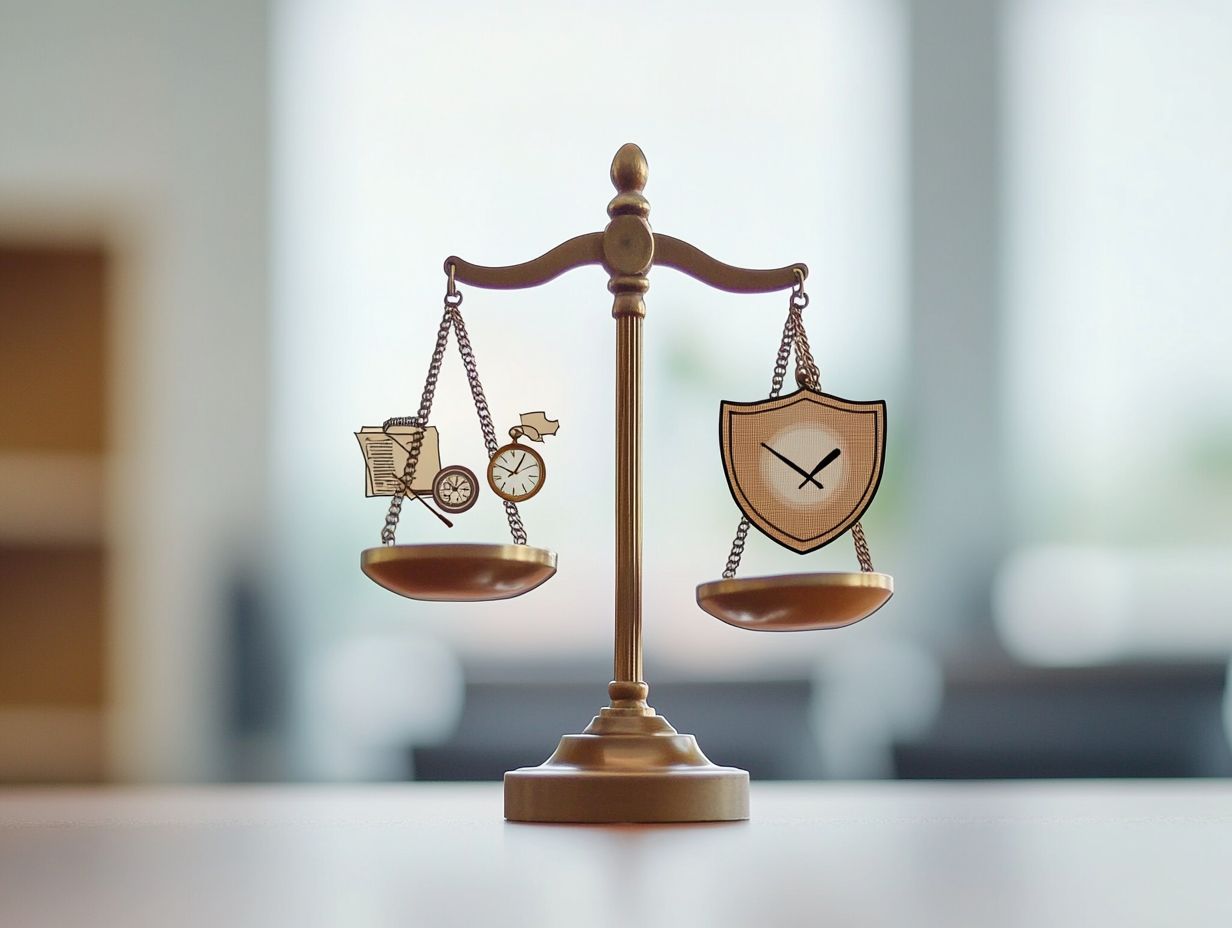
The Right to a Public Trial is firmly established in the Sixth Amendment, serving as a vital safeguard for transparency within the legal system. It ensures that criminal proceedings remain open to public scrutiny, thereby upholding justice and curbing potential abuses of power in the judiciary.
This essential principle allows you to witness the administration of justice and fosters a sense of community involvement and trust in judicial outcomes. When the public is present, it acts as a counterbalance to any missteps by law enforcement and the judiciary, making it more difficult for injustices to go unnoticed.
However, the challenge lies in balancing this need for transparency with the privacy rights of defendants and victims, especially in sensitive or high-profile cases. Protecting the dignity and rights of all individuals involved while adhering to the core values of public accountability is crucial for maintaining the integrity of the legal process.
Knowing your rights empowers you to stand up for justice in any legal situation.
8. The Right to a Jury Trial
The Right to a Jury Trial keeps your trial fair and just. Protected by the Sixth Amendment, it ensures that you are judged by a jury of your peers. This fundamental right is essential for maintaining a judicial process that reflects community values, ultimately strengthening the legitimacy of the legal system.
This principle has evolved significantly, adapting to societal changes and our growing understanding of justice. Originating in England, the right to a jury trial has become a cornerstone of democratic governance and individual liberty.
This right has a significant impact on you; it not only provides a sense of security but also shapes how your legal representation is approached. Attorneys must develop their strategies with the understanding that a diverse group will assess the evidence, emphasizing the crucial role of community insights in delivering justice.
9. The Right to Be Informed of Charges
The Right to Be Informed of Charges is a fundamental protection that makes sure you know the specific accusations against you. This vital right facilitates a fair legal process and enables you to prepare a strong defense against criminal charges.
By preserving due process, this right plays a crucial role in upholding the fairness of the legal system. Law enforcement must clearly state the charges against you, helping to prevent wrongful accusations and ensuring your defense can adequately address the allegations.
This transparency fosters accountability within the criminal justice system, compelling law enforcement to conduct thorough investigations before bringing charges. When you are well-informed, it strengthens public trust in the entire justice system.
10. The Right to Be Protected from Double Jeopardy
The Right to Be Protected from Double Jeopardy ensures that you cannot be tried again for the same crime. This vital protection shields you from relentless legal harassment and upholds the principle of finality within the criminal justice system.
This principle balances your rights as the accused with society’s pursuit of justice, instilling a sense of security. You can move forward without the worry of facing multiple prosecutions for the same offense.
While there are exceptions, such as cases involving mistrials, these unique scenarios have tested the boundaries of this doctrine. Legal scholars and courts continue to discuss the implications and effectiveness of double jeopardy within the broader legal framework.
11. The Right to Be Informed of Rights
The Right to Be Informed of Rights ensures that you, especially if taken into custody, know your rights including the Miranda rights before any interrogation. This enables you to make informed decisions about your legal representation and interactions with law enforcement.
This right acts as a crucial shield against self-incrimination, allowing you to understand the potential consequences of your statements. It plays a critical role in upholding legal protections for defendants, fostering a climate where justice can truly thrive.
When you know your rights, you can take control of your situation, ultimately shifting the balance of power in your interactions with law enforcement. Clear communication of these rights promotes ethical practices and bolsters public trust in the justice system, underscoring the importance of procedural fairness in maintaining accountability.
12. The Right to an Impartial Judge
The Right to an Impartial Judge is a critical pillar of the legal system, guaranteeing that you receive a fair trial from a neutral judge. This right upholds due process and safeguards your individual rights within the judicial framework.
It significantly enhances the integrity of the judicial system, acting as a bulwark against biases that might distort trial outcomes. When judges uphold impartiality, they cultivate public confidence in legal proceedings, an essential element for a functioning democracy.
To address potential biases, mechanisms like stepping aside from a case enable judges to remove themselves when conflicts of interest may arise. Ongoing training and oversight play a vital role in reinforcing the commitment to fairness, ensuring that everyone involved in legal disputes can trust in the objectivity of the judiciary.
13. The Right to Challenge Evidence
The Right to Challenge Evidence is a pivotal part of your rights in legal proceedings, enabling you to contest the admissibility and credibility of the evidence presented by the prosecution. This right ensures you receive due process and a fair trial.
This right includes various processes, such as requests to keep certain evidence out of the trial, which allow you to argue against the introduction of unlawfully obtained evidence. These requests can be critical in protecting you from unreasonable searches that compromise the integrity of your legal standing.
Your defense attorney plays a vital role in navigating these intricate legal waters, evaluating the circumstances surrounding the evidence collection, and ensuring compliance with constitutional provisions. By advocating for the exclusion of tainted evidence, your attorney helps maintain the integrity of the judicial process, ultimately serving to uphold justice and safeguard your rights as the accused.
14. The Right to Appeal
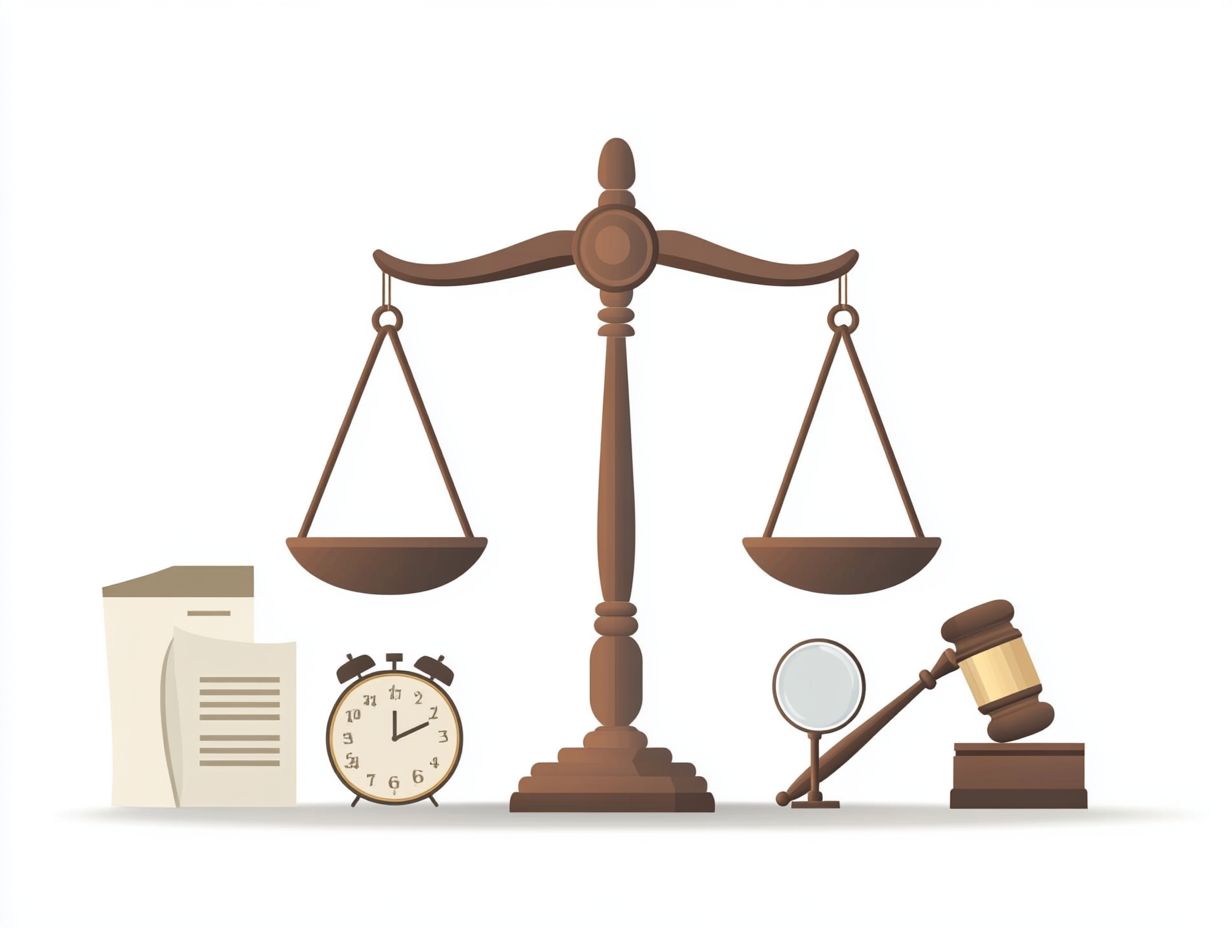
The Right to Appeal enables you to seek a review of your trial proceedings. The appeal process reinforces the integrity of the judicial system and protects your rights within the legal framework.
This journey includes various types of appeals, such as direct appeals and post-conviction motions, each with its own specific criteria that must be satisfied for consideration.
Key Reasons You Can Appeal:
- Procedural errors
- Ineffective assistance of counsel
- Newly discovered evidence that could potentially change the outcome of your case
The implications of this right are significant. It safeguards against wrongful convictions and champions the principle of fair legal representation. By allowing you to challenge your convictions, the appeal process acts as a vital mechanism for achieving justice and maintaining public trust in the legal system.
15. The Right to Due Process of Law
The Right to Due Process of Law is a cornerstone principle embedded in the U.S. Constitution, guaranteeing that every individual, particularly those accused, receives fair legal protections and an open judicial process before any infringement on life, liberty, or property occurs.
This right has its origins in the Magna Carta of 1215, which established the foundations for legal fairness and equity. In the American legal landscape, due process is essential, intricately linked with other constitutional rights like the right to a speedy trial and legal counsel.
These interconnected safeguards enable defendants to present a strong defense, cultivating an environment where justice can truly thrive. This comprehensive framework not only shields individuals from arbitrary government actions but also bolsters public trust in the integrity of the legal system, reinforcing the notion that everyone deserves a fair hearing, no matter the charges they face.
What Are the Rights of the Accused in the United States?
The rights of the accused in the United States are vital legal protections protected by the U.S. Constitution and found in the Bill of Rights. These rights ensure you are treated fairly while facing criminal charges, upholding justice and individual liberty.
Your rights include a fair trial, the right to an attorney, and protections against self-incrimination meaning you don t have to testify against yourself and double jeopardy, which prevents you from being tried for the same crime twice. These protections developed in response to past abuses in legal systems, aiming to prevent wrongful convictions and secure your due process.
As society has changed, these rights have been fundamental in shaping modern criminal justice practices, ensuring you have a chance to mount a strong defense. Their importance remains evident today, highlighting the balance between public safety and individual freedoms, and sparking ongoing discussions about the integrity of our justice system.
How Have These Rights Evolved Over Time?
The evolution of the rights of the accused showcases a dynamic legal landscape shaped by historical events, landmark Supreme Court decisions, and societal changes. These factors work together to strengthen legal protections for individuals in the criminal justice system.
Key moments, like the establishment of Miranda rights in the 1966 case of Miranda v. Arizona, underscored the need to inform individuals of their rights during police questioning.
The 1963 ruling in Gideon v. Wainwright reinforced that defendants who cannot afford an attorney must receive legal representation, marking a significant step towards fair treatment under the law.
As societal values evolve, driven by civil rights movements and public advocacy, legal standards continue to change, reflecting the ongoing quest for justice and fair representation in court.
What Happens If These Rights Are Violated?
When the rights of the accused are violated, the consequences can be serious not just for the defendant but also for the integrity of the legal system. This often leads to remedies such as evidence suppression, retrials, or even the dismissal of charges, emphasizing the importance of upholding these rights.
These remedies are essential for preserving justice and ensuring fair treatment under the law. For example, motions to suppress evidence can keep unlawfully obtained materials from tainting a trial, protecting you from unfair information.
The appeals process is another critical safeguard, allowing for revisiting convictions when judicial errors are discovered. Ultimately, protecting these rights not only defends defendants but also fosters public trust in the judicial system.
This highlights the need for careful oversight to prevent wrongful convictions and maintain justice.
How Do These Rights Protect the Innocent?
The rights of the accused are crucial in protecting innocent individuals from wrongful convictions, ensuring that the legal process maintains high standards of fairness. This, in turn, safeguards individual liberties and upholds the integrity of the criminal justice system.
At the core of this is the presumption of innocence, meaning you are considered innocent until proven guilty. This principle shifts the burden of proof to the prosecution, creating a strong defense against hasty judgments.
For example, in the case of Kenneth Waters, DNA evidence confirmed his innocence years after his conviction. Legal counsel plays a vital role in navigating the complex legal landscape, which can lead to exoneration. The exoneration of the Central Park Five is another example, where inadequate representation contributed to their wrongful convictions.
Together, these rights ensure that justice is served and the innocent are protected, allowing the legal system to function effectively and equitably.
What Is the Role of the Defense Attorney in Protecting These Rights?
Your defense attorney is your best ally in safeguarding your rights. They serve as a critical advocate within the legal system to ensure you receive effective counsel and that your rights are upheld throughout the criminal justice process.
By carefully reviewing the evidence and building a solid defense plan, they work to challenge any unfair practices that could jeopardize your position. They also analyze relevant case law to strengthen your case.
Through effective communication whether in negotiations, courtroom appearances, or discussions with you they foster trust and understanding, enabling you to make informed decisions about your case.
This support is crucial because the outcomes of legal proceedings can profoundly impact your life, affecting not only your freedom but also your future opportunities.
A skilled defense attorney can change your future. Their arguments can turn a dire situation into a chance for a positive outcome.
Frequently Asked Questions
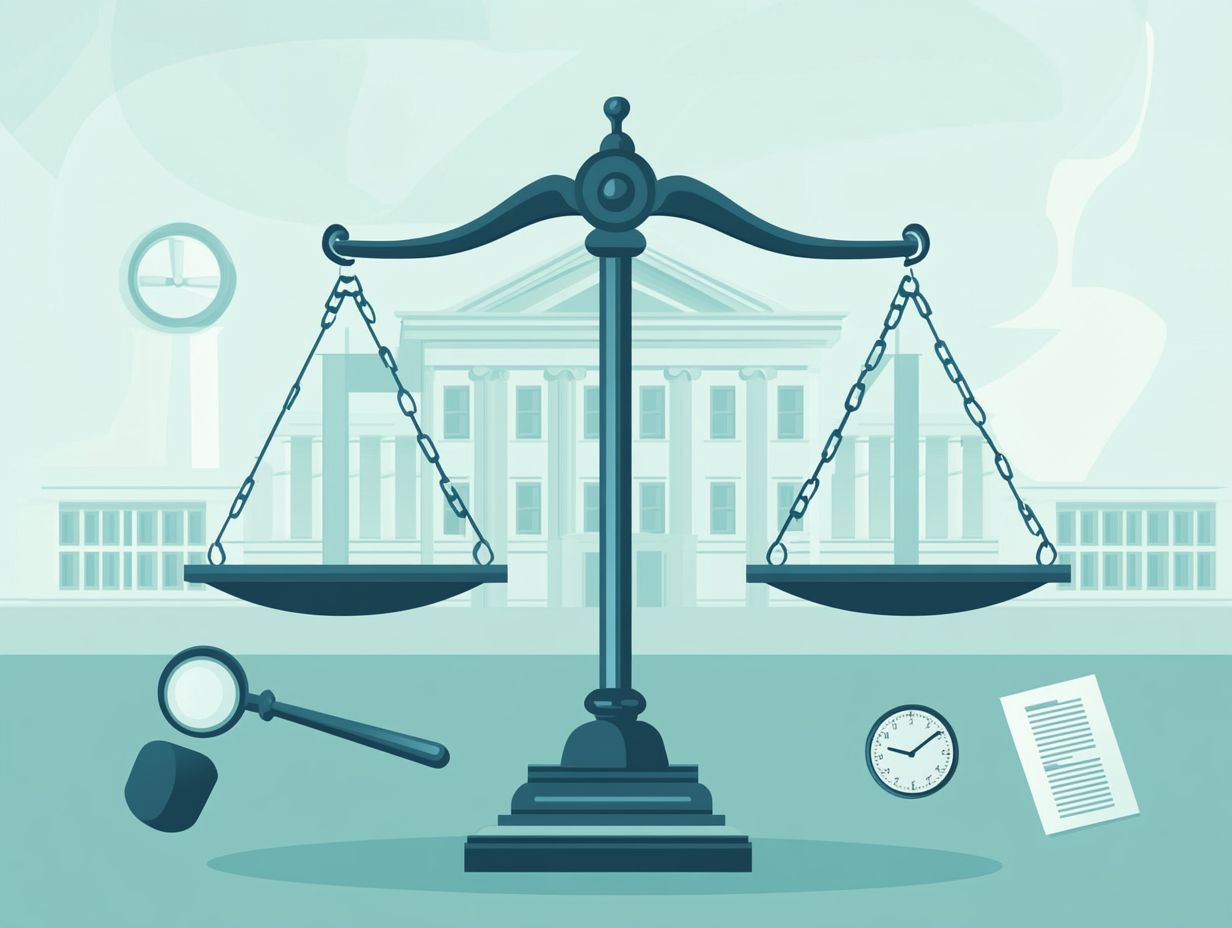
What are the top five rights of the accused?
The top five rights of the accused include the right to remain silent, the right to an attorney, the right to a fair and speedy trial, the right to a trial by jury, and the right to be presumed innocent until proven guilty.
Why is the right to remain silent important?
The right to remain silent allows the accused to avoid making statements that could hurt their case. This means that they do not have to say anything that could be used against them in court.
What does the right to an attorney mean?
The right to an attorney means that the accused has the right to have a lawyer represent them in court. If they cannot afford a lawyer, one will be provided to them.
What does a fair and speedy trial mean?
A fair and speedy trial means that the accused has the right to a timely trial. They should not have to wait an unreasonable amount of time for their case to be heard.
Why is the right to a trial by jury important?
The right to a trial by jury ensures that the accused will have their case heard by a group of their peers. This helps to prevent biases and ensures a fair trial.
What does it mean to be presumed innocent until proven guilty?
This means that the accused is innocent until the prosecutor can prove their guilt beyond a reasonable doubt. The burden of proof is on the prosecutor, not the accused.
If you or someone you know is facing legal challenges, don’t hesitate to reach out for help today!

